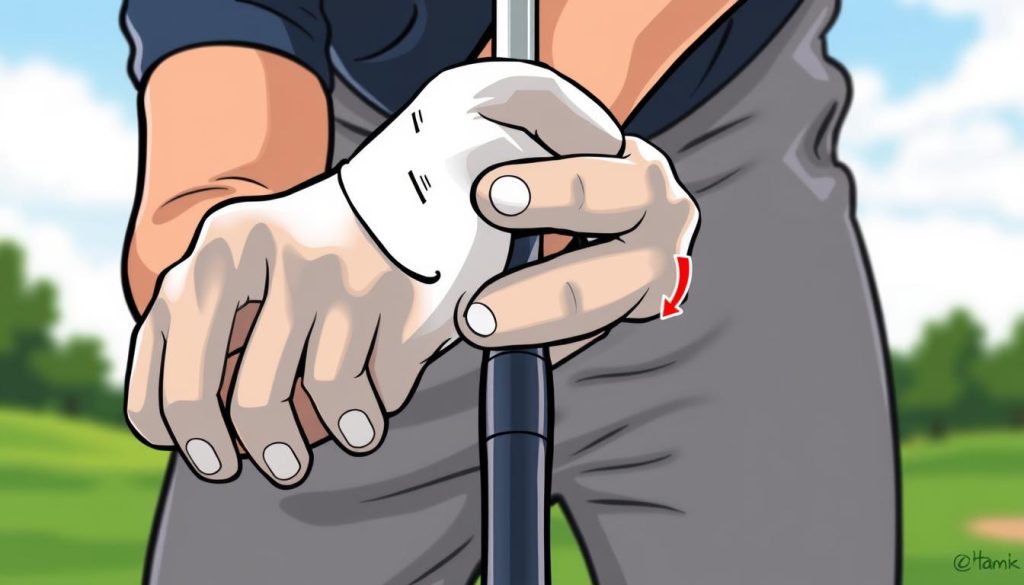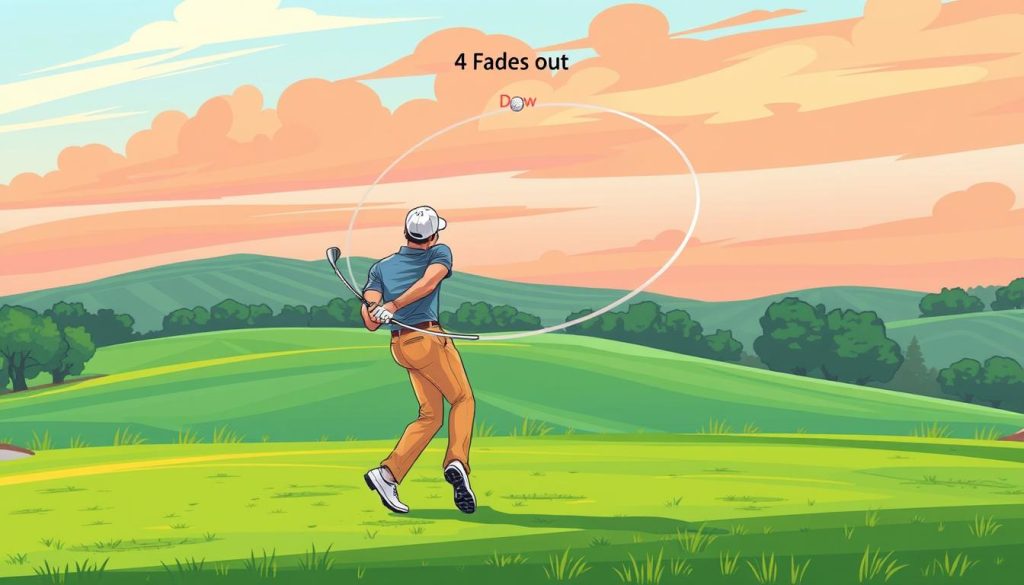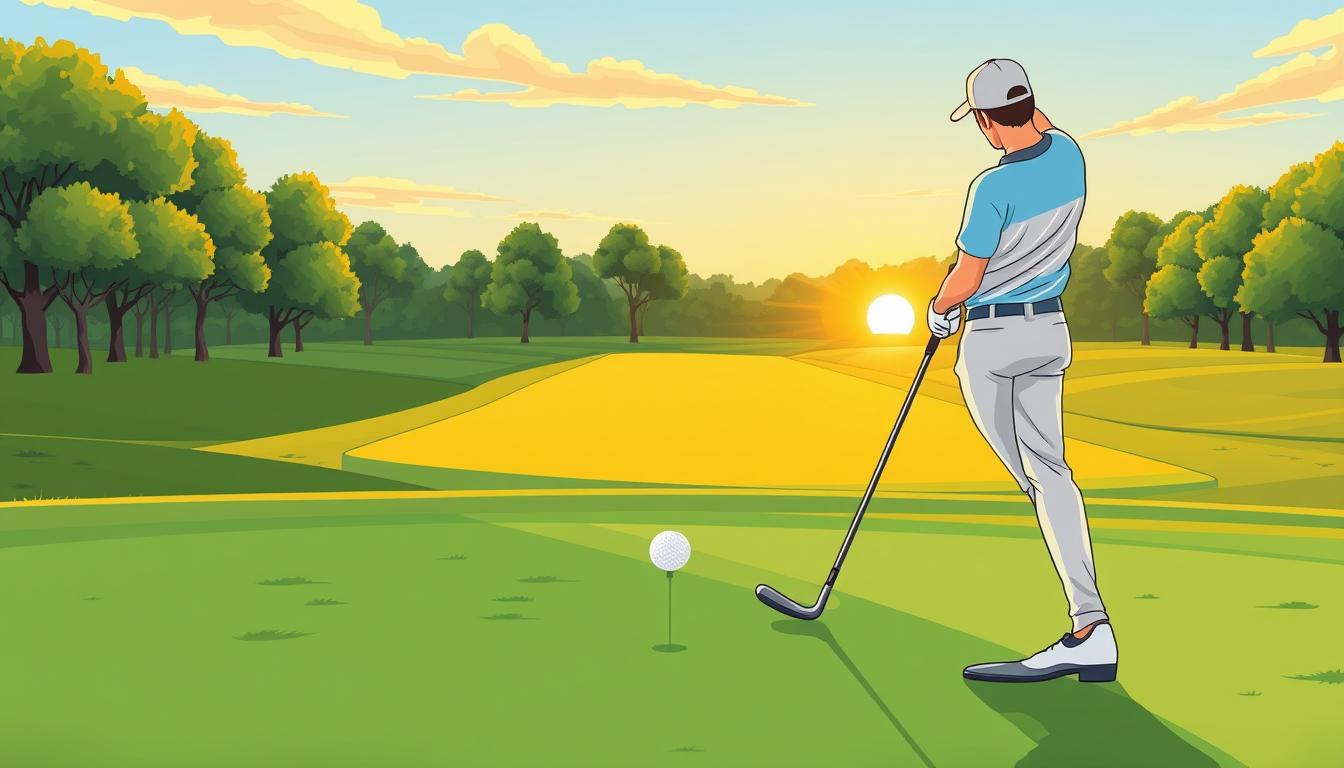Unlock your full driving potential with this detailed guide. It’s perfect for both new and experienced golfers. Learning to drive well can boost your distance and overall game. You’ll find tips on techniques, the right equipment, and how to practice for better drives.
For those who learn better by watching, golf instruction videos are a great tool. They show you how to swing right, focusing on speed, ball position, and grip. This will help you hit drives that are straighter and stronger.
Knowing the science behind a great drive is key. Clubhead speed, ball speed, and smash factor all affect how far you can hit the ball. For example, a 1 mph increase in ball speed can add 2 yards to your drive. A smash factor of 1.50 means you’re transferring energy well from club to ball.
Key Takeaways
- Focus on improving clubhead speed for longer drives
- Utilize launch monitor data to track performance
- Position the ball correctly in your stance
- Maintain proper weight distribution to reduce slices and hooks
- Use golf instruction videos for visual learning
- Practice regularly to develop consistency and power
Understanding Driver Fundamentals and Equipment Setup
Mastering your golf drive starts with the right golf equipment. Your driver is key for powerful, accurate shots. Let’s explore the basics of driver setup and its impact on your game.
Choosing the Right Driver Shaft Flex
Driver shaft flex is crucial for your swing. It’s not a one-size-fits-all situation. Your ideal flex depends on your swing speed:
- X-Stiff: Swing speeds over 105 mph
- Stiff: 97-104 mph
- Regular: 84-96 mph
- Senior: 72-83 mph
- Ladies: Below 72 mph
Choosing the right flex ensures optimal energy transfer and control.
Importance of Launch Monitor Data
A launch monitor is key for drive improvement. It gives you vital data on your swing speed, launch angle, and spin rate. This info helps you refine your technique and pick the right equipment.
Driver Fitting and Customization
Custom fitting your driver can greatly improve your game. Consider these adjustable features:
- Loft: Aim for 10.5 degrees or more if you’re a beginner
- Weight distribution: Affects ball flight and forgiveness
- Face angle: Helps control shot shape
Remember, a wider stance often leads to better strikes. Try different setups to find what works best for you. With the right equipment and setup, you’re on your way to mastering your drive.
Mastering the Perfect Golf Setup Position
A proper golf stance is key for strong and accurate drives. At the Bayonne GC member-guest event, players showed great setup positions. Let’s look at the essential parts of the perfect golf setup.
Ball Position and Golf Tee Height
Place the ball off your left ear for a neutral setup. This helps you hit the ball on the upswing, boosting distance. The height of your golf tee is also important. Teeing too low can lower the ball’s launch angle and increase spin, affecting your drive.
Stance Width and Alignment
Stand with your feet shoulder-width apart for balance. Spread your weight evenly on both feet. A slight lean of the shaft towards the target helps keep your posture right at impact. Turning your feet slightly outward increases rotation in your backswing, adding power.
Grip Pressure and Hand Position
Your golf grip is crucial for consistent drives. Make sure the ‘Vs’ formed by your thumbs and forefingers point between your right shoulder and ear. Keep your grip pressure just right for club rotation through impact. This improves control without losing power.
| Setup Element | Correct Position | Common Mistake |
|---|---|---|
| Ball Position | Off left ear | Too far back in stance |
| Stance Width | Shoulder-width | Too narrow or wide |
| Weight Distribution | Balanced over both feet | Too much on front or back foot |
| Shaft Lean | Slight lean towards target | Excessive forward or backward lean |
| Grip ‘Vs’ | Pointing between right shoulder and ear | Pointing outside right shoulder |
By focusing on these setup elements, you’ll build a solid foundation for consistent, powerful drives. Remember, practice makes perfect!
Golf Driving Tips Guide
Mastering your golf drive can change your game. This guide has 23 essential tips to boost your performance. We’ll cover key swing mechanics and offer practical advice to improve your driving.
To start, tee the ball high for better contact. Focus on speed at the bottom of your swing, not the top. Keep arm speed through the finish to add power. A brief pause at the top can help with timing and control.
Proper equipment fitting is key. Use a launch monitor to track your driving metrics. Record your swing for analysis and get personalized instruction from a golf pro.
| Tip Category | Description | Benefit |
|---|---|---|
| Ball Position | Adjust ball positioning | Optimize drive trajectory |
| Aim | Focus on correct aiming | Improve drive accuracy |
| Physical Conditioning | 8-week golf fitness program | Increase swing speed |
Remember, consistent practice is crucial. Try these 23 swing thoughts to find your best 2-3. With dedication and the right approach, you’ll see big improvements in your golf driving.
Generating Maximum Clubhead Speed
Boosting clubhead speed is key to hitting the ball farther in golf. To hit the ball longer, work on your body mechanics and swing. Here are some tips to help you hit the ball as far as possible.
Body Rotation Mechanics
Good golf swing rotation is vital for speed. Begin with a full shoulder turn in your backswing. This lets your hips rotate about 45 degrees. Then, start the downswing with your lower body, building power that goes to the club.
Using Ground Forces Effectively
Ground forces are powerful for increasing swing speed. Push against the ground during your downswing, starting with your back foot and moving to your front. This creates a vertical force that boosts your swing power.
Maintaining Swing Width
Swing width is important for speed. Keep your arms straight throughout the swing, avoiding bent elbows. This wider swing path lets you accelerate the club more.
| Golfer Type | Average Clubhead Speed (mph) |
|---|---|
| Male Amateur | 80-90 |
| LPGA Professional | 90-100 |
| PGA Tour Professional | 120+ |
| Long Drive Competitor | 140+ |
To increase clubhead speed, you need good technique and physical training. Practice these tips regularly to see your driving distance improve.
Optimizing Ball Strike for Distance
To hit the ball farther, focus on how you strike it. Key areas include golf ball speed, smash factor, and hitting the center of the ball. Improving these can boost your distance, even if your swing speed doesn’t change.
Golf ball speed is key for distance. Every 1 mph increase can add about 2 yards. The smash factor shows how well you transfer energy from club to ball. Aim for a smash factor of 1.50 for the best results.
Hitting the ball’s center is crucial for speed and distance. Consistent center hits can add yards without needing a faster swing. Use alignment sticks and impact tape to track your hits.
| Scoring Average | Average Driving Distance |
|---|---|
| 100-105 | 172 yards |
| 90-95 | 193 yards |
| 80-85 | 217 yards |
| 72 or better | 251 yards |
To hit the ball farther, aim to hit “up” on it. This helps with a higher launch and less spin, perfect for longer drives. Try different tee heights to match your swing. A positive angle of attack can add up to 20 yards for casual players.
Lastly, consider getting clubs fitted just for you. A custom driver can add 20-30 yards to your drive. With these tips, you’ll see your ball strike improve and your distance increase.
Understanding Wrist Mechanics for Better Drives
Mastering wrist mechanics is key to better golf drives. A proper golf wrist hinge boosts your power and control. Let’s dive into the important parts of wrist mechanics to improve your driving.
Proper Wrist Hinge in Backswing
A flat lead wrist at the backswing’s top is vital for consistency. Studies reveal 80% of a golf ball’s direction comes from the clubface angle. Keeping your lead wrist flat helps with forward shaft lean, clean contact, and better distance.

Release Through Impact
Releasing the golf club right is crucial for a strong drive. Pros keep their wrists extended to build power and compression. Your lead wrist is key for consistent ball striking. Work on wrist flexion and extension to control the clubface and hit straighter.
Preventing Early Extension
Early extension in golf happens when hips move toward the ball in the downswing. This can cause poor contact and less power. To avoid early extension, keep your posture steady and focus on body rotation, not lifting up.
| Wrist Action | Impact on Drive |
|---|---|
| Flat lead wrist | Promotes consistency and clean contact |
| Proper release | Generates power and improves compression |
| Preventing early extension | Maintains posture and improves contact |
By focusing on these wrist mechanics, you can greatly enhance your driving. Remember, practice and consistency are crucial for mastering these techniques.
Physical Conditioning for Powerful Drives
Golf fitness is key to better driving. A fit body boosts your power and consistency. Let’s see how strength and flexibility can change your game.
The average tour driving distance has grown from 274 yards in 1980 to 313 yards in 2016. This jump is thanks to better physical training. Strength training is crucial for faster club head speed and longer drives.
Work on your core, glutes, and hips. These areas are essential for power in your swing. Squats, lunges, and anti-rotation chops are great for building strength for explosive swings.
Flexibility is also vital. It lets you turn fully behind the ball, increasing your power. Stretch your hips, shoulders, and back often. This improves your swing and lowers injury risk. Remember, 80% of golf injuries are from overuse, with the lower back most affected.
To get the most from your physical training:
- Begin with stability exercises for a strong base
- Move to strength training for power
- Add cardio to keep energy up during your game
- Include flexibility exercises to boost your swing range
Investing in golf fitness will improve your driving and overall game. A strong, flexible body is your key to powerful, consistent drives.
Advanced Ball Flight Control
Mastering golf ball flight is a game-changer for any golfer. Learning to shape shots and control trajectory can boost your driving skills. Let’s explore the techniques to help you dominate the tee box.
Managing Shot Shape
Shot shaping in golf is an art form. First, figure out your natural ball flight – whether it’s a draw or fade. Then, you can aim to curve the ball on purpose.
To hit a draw, close your stance a bit and aim right of your target. For a fade, open your stance and aim left. By practicing these, you’ll get better control over your drives.

Controlling Trajectory
Controlling the trajectory of your drives is crucial. To hit it low, tee the ball lower and play it back in your stance. For a higher ball flight, tee it up higher and position the ball forward.
Your attack angle greatly affects the trajectory. A downward strike leads to a lower flight, while an upward hit makes the ball soar.
Wind Adjustment Techniques
Wind can greatly impact your game. When facing a headwind, tee the ball lower and use a more lofted driver to keep it down. For tailwinds, tee it high and “let it fly.”
In crosswinds, aim into the wind and let it shape your shot back to target. These tips will help you handle tricky conditions with confidence.
By mastering these advanced ball flight control techniques, you’ll be ready for any driving challenge. Remember, practice is key to perfecting shot shaping and adapting to wind conditions.
Mental Game Strategies for Driving
Golf psychology is key to mastering the mental game, especially in driving. Your mental state can greatly affect your performance. Let’s look at some effective techniques to boost your driving skills.
The “Mushin Golf” concept is a powerful tool. It aims to achieve a state of “no mind,” free from distractions. This clears your mind, allowing you to reach your full golfing potential.
“Breath Watching” is a great golf concentration technique. It helps you stay focused in the moment, improving your concentration during drives. Here’s how to do it:
- Take deep breaths through your nose
- Focus solely on your breathing
- Aim to reduce your respiratory rate to 3-5 deep breaths per minute
This breathing exercise boosts oxygen exchange and relaxation. By using Breath Watching on the course, you can overcome fear, ego, and doubt that might hinder your driving.
Having a pre-shot routine is also crucial. A 20-30 second routine can clear your mind and prepare you for each drive. Stay present and focus on one shot at a time for the best results.
When distractions come, keep your focus on the task. Golf psychology shows that mental resilience is vital for performance. By mastering these strategies, you’ll enhance your driving and overall golf game.
Technology and Training Aids for Improvement
Golf technology has changed how we improve our game. Tools like launch monitors and video analysis give us deep insights. Let’s see how these tools can boost your driving skills.
Launch Monitor Benefits
Launch monitors are key for analyzing your swing. They show data on ball flight, clubhead speed, and spin. With this info, you can spot and fix drive issues and see your progress.
Video Analysis Tools
Video analysis software lets you review your swing from different views. It spots flaws you might miss. With quick feedback, you can tweak your drive right away.
Practice Drills and Routines
Adding specific drills to your routine can really help your drive. Focus on improving tempo, alignment, and impact. Regular use of these drills, along with tech tools, will show clear improvements.
| Training Aid | Price | Benefit |
|---|---|---|
| Orange Whip | $109.99 | Improves swing balance and flexibility |
| Super Speed Golf | $199.99 | Increases clubhead speed by 5% in six weeks |
| DST Compressor | $99.99 | Aids in achieving better impact position |
| TIBA Putt | $79.99 | Enhances putting stroke path |
Using these golf technologies and training aids can speed up your improvement. You’ll see more consistent and powerful drives on the course.
Conclusion
Mastering golf drives is a journey that needs technique, the right equipment, and mental strength. By using golf improvement strategies, you can hit the ball more consistently. This will make your game better. The secret to success is patient practice and using the best golf practice tips.
Improving your stance and choosing the right equipment are key. Proper body rotation, creating lag in the downswing, and keeping balance are essential for strong drives. Also, don’t forget about club fitting and using adjustable drivers to fit your swing.
Managing the course and picking the right club are also important. Sometimes, choosing a 3-wood or hybrid over a driver can be better. As you get better, work on a smooth tempo and improve your physical fitness to support your swing.
Golf improvement is a complete process. By adding these tips to your practice and staying positive, you’ll hit the ball more consistently and powerfully. Remember, every top golfer began as a beginner. Your hard work will pay off on the course.
FAQ
How can I increase my driving distance in golf?
What’s the ideal ball position for driving?
How high should I tee my golf ball for driving?
What’s the importance of shaft flex in a driver?
How can I prevent slicing my drives?
What role does physical conditioning play in improving drives?
How can I use ground forces effectively in my golf swing?
What is smash factor in golf, and why is it important?
How can I improve my mental game for better driving?
What are some effective practice drills for improving my drives?
Source Links
- https://hackmotion.com/golf-driving-tips/
- https://sundaygolf.com/blogs/news/golf-driving-tips?srsltid=AfmBOoqroeyx130Wkpv1GwMndW4g4S6qg4kN-s7E1wHobIVsY1en25qk
- https://www.golfmonthly.com/tips/step-by-step-guide-to-the-driver-set-up
- https://www.golfavenue.com/us/blog/golf-tips/five-golf-driving-tips-for-beginners?srsltid=AfmBOooRgej1A0qrTuftfydzSGzs-qh56GAa8UJOubrtn9Te0qLxuxyW
- https://sundaygolf.com/blogs/news/golf-driving-tips?srsltid=AfmBOorsKq-9MkcQSWhqmXMpqSTOgSc14tS3e9tAZ5ktcqs30SgFFojf
- https://golf.com/instruction/perfect-golf-swing-balanced-setup/
- https://hackmotion.com/how-to-hit-driver-consistently/
- https://sundaygolf.com/blogs/news/golf-driving-tips?srsltid=AfmBOor5kJat6UikkvU2kiLp7NRtKvsnQL8FIrYXCFuchs0dP66buCI9
- https://www.pgaplay.co.uk/learn/master-your-golf-drive-a-comprehensive-guide-for-beginners/
- https://hackmotion.com/how-to-increase-clubhead-speed/
- https://swingtrainer.com/blogs/instruction/increase-club-head-swing-speed?srsltid=AfmBOorRBrqcTfNq27K8eitVWTMNOMNdrOYtUKoyB1QXpnG1jPC6Jpz0
- https://fitforgolf.blog/club-head-speed-reverse-engineered/
- https://practical-golf.com/maximizing-driver-distance
- https://www.dannymaude.com/blog/Better Ball Striking Just Happens When You Do This
- https://www.hjgt.org/blog/tip-tuesday-four-tips-to-help-drive-the-ball-further/
- https://hackmotion.com/wrist-mechanics-in-golf/
- https://hackmotion.com/wrist-action-in-golf-swing/
- https://simplifaster.com/articles/golf-strength-conditioning/
- https://www.trainheroic.com/blog/building-power-and-speed-for-your-golf-swing/
- https://thealliancerx.com/golf-exercises/
- https://thegolfacademy.org/2016/01/17/two-keys-to-crush-your-drives-long-and-straight/
- https://swingfit.net/golf-tips-for-beginners-driving/
- https://rotaryswing.com/golf-instruction/mentalgolfgame/mental-golf-game-introduction
- https://hackmotion.com/golf-mental-tips/
- https://www.tencom.com/blog/applying-cutting-edge-materials-and-methods-for-golf-training-aids
- https://www.todays-golfer.com/equipment/best/golf-training-aids-us/
- https://practical-golf.com/golf-training-aids
- https://golfforbeginners.academy/golf-driving-tips-for-beginners/
- https://www.golf-madness.com/blog/best-driving-tips-for-beginners-my-top-9-tips
- https://skillest.com/blog/a-comprehensive-guide-to-mastering-the-golf-swing/


